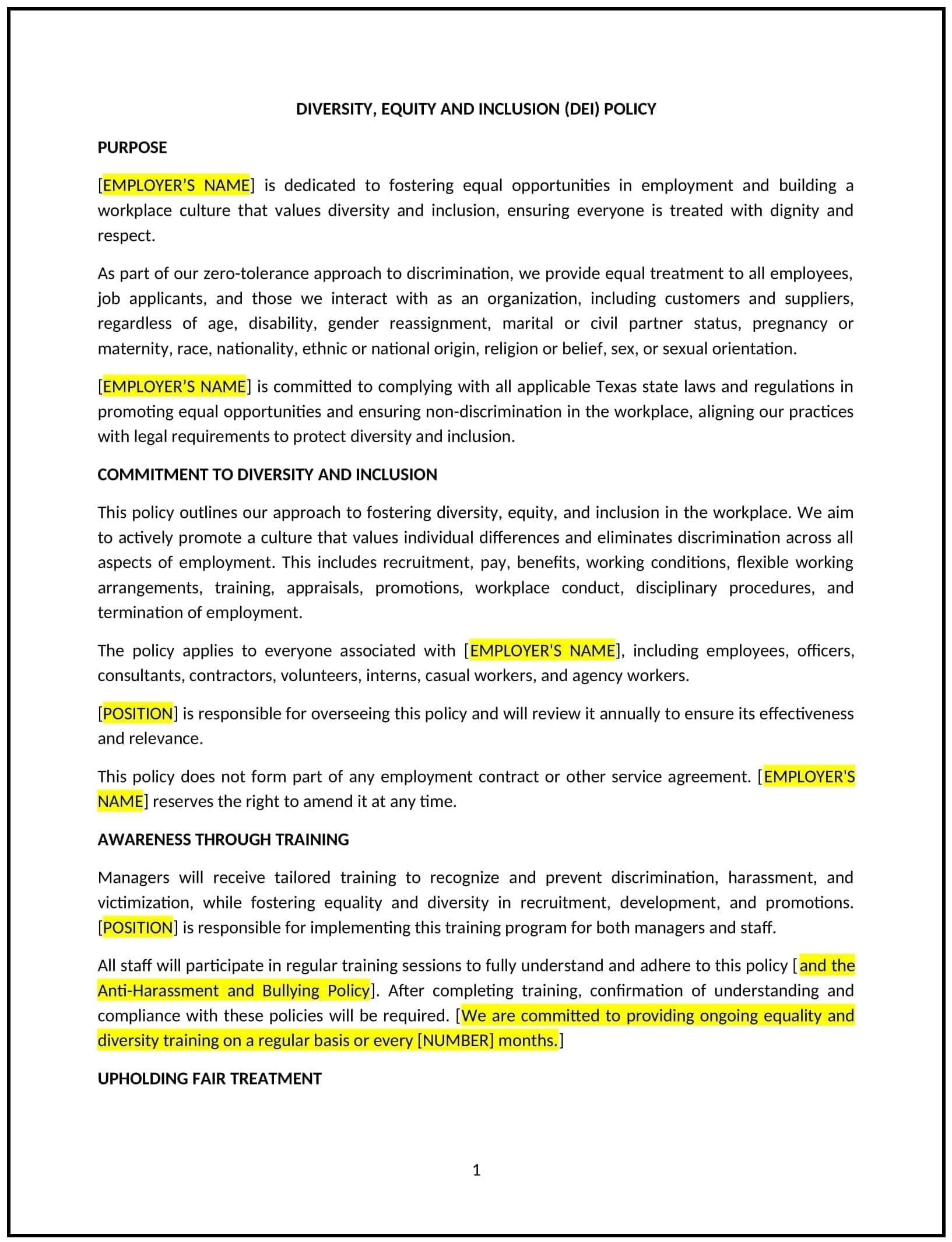Diversity, equity, and inclusion (DEI) policy (Texas): Free template
Got contracts to review? While you're here for policies, let Cobrief make contract review effortless—start your free review now.

Customize this template for free
Diversity, equity, and inclusion (DEI) policy (Texas)
This diversity, equity, and inclusion (DEI) policy is designed to help Texas businesses establish clear guidelines for promoting diversity and ensuring equity in the workplace. Whether businesses are fostering an inclusive environment, addressing systemic biases, or ensuring equal opportunities, this template provides a structured approach to DEI practices that support all employees and create a more diverse workforce.
By adopting this policy, businesses can enhance their workplace culture, drive innovation, and comply with applicable laws while providing a fair and inclusive environment for all.
How to use this diversity, equity, and inclusion (DEI) policy (Texas)
- Define diversity, equity, and inclusion: Clearly articulate the definitions of diversity, equity, and inclusion in the context of the workplace and explain how each contributes to the overall success of the company.
- Set DEI goals: Outline specific DEI objectives, such as increasing the representation of underrepresented groups, providing equal opportunities for all employees, and creating a workplace where everyone feels valued and included.
- Implement inclusive recruitment practices: Specify strategies for recruiting a diverse workforce, including posting job openings in diverse networks, using inclusive language in job descriptions, and eliminating bias from hiring decisions.
- Establish training and education: Offer DEI training for all employees, especially leadership, to raise awareness of unconscious bias, promote inclusive behaviors, and create a shared understanding of the importance of diversity and inclusion.
- Promote equal opportunity: Ensure that all employees have equal access to career development, training, and advancement opportunities, and create pathways for diverse talent to thrive.
- Set accountability measures: Define how progress will be measured, including setting clear benchmarks for diversity representation, tracking employee feedback, and regularly assessing the effectiveness of DEI initiatives.
Benefits of using this diversity, equity, and inclusion (DEI) policy (Texas)
This policy offers several benefits for Texas businesses:
- Fosters a more inclusive work culture: A DEI policy promotes a culture where all employees feel welcomed, respected, and valued, which can improve morale, engagement, and retention.
- Enhances business performance: A diverse and inclusive workforce brings a variety of perspectives, which can lead to greater innovation, problem-solving, and better decision-making.
- Reduces the risk of discrimination: By addressing biases and ensuring equitable treatment, businesses can reduce the likelihood of discrimination claims or lawsuits, and improve compliance with federal and state laws.
- Improves recruitment and retention: A strong DEI policy can help businesses attract top talent from diverse backgrounds and increase retention by creating an environment where employees feel supported.
- Strengthens company reputation: Demonstrating a commitment to DEI enhances the company’s reputation as a socially responsible and ethical employer, which can increase customer loyalty and business opportunities.
Tips for using this diversity, equity, and inclusion (DEI) policy (Texas)
- Communicate the policy: Ensure that all employees are aware of the DEI policy and understand how it applies to their roles and behaviors within the organization.
- Offer ongoing education: Regularly provide DEI training, resources, and workshops to deepen employees' understanding of inclusion, unconscious bias, and cultural competency.
- Measure progress: Regularly track and report on key DEI metrics, such as employee diversity, representation in leadership roles, and employee satisfaction with DEI efforts.
- Create feedback mechanisms: Provide channels for employees to share feedback on the company’s DEI efforts, such as surveys, focus groups, or anonymous reporting systems.
- Review regularly: Update the policy periodically to reflect changes in Texas state laws, federal regulations, or best practices in DEI to ensure the policy remains relevant and effective.